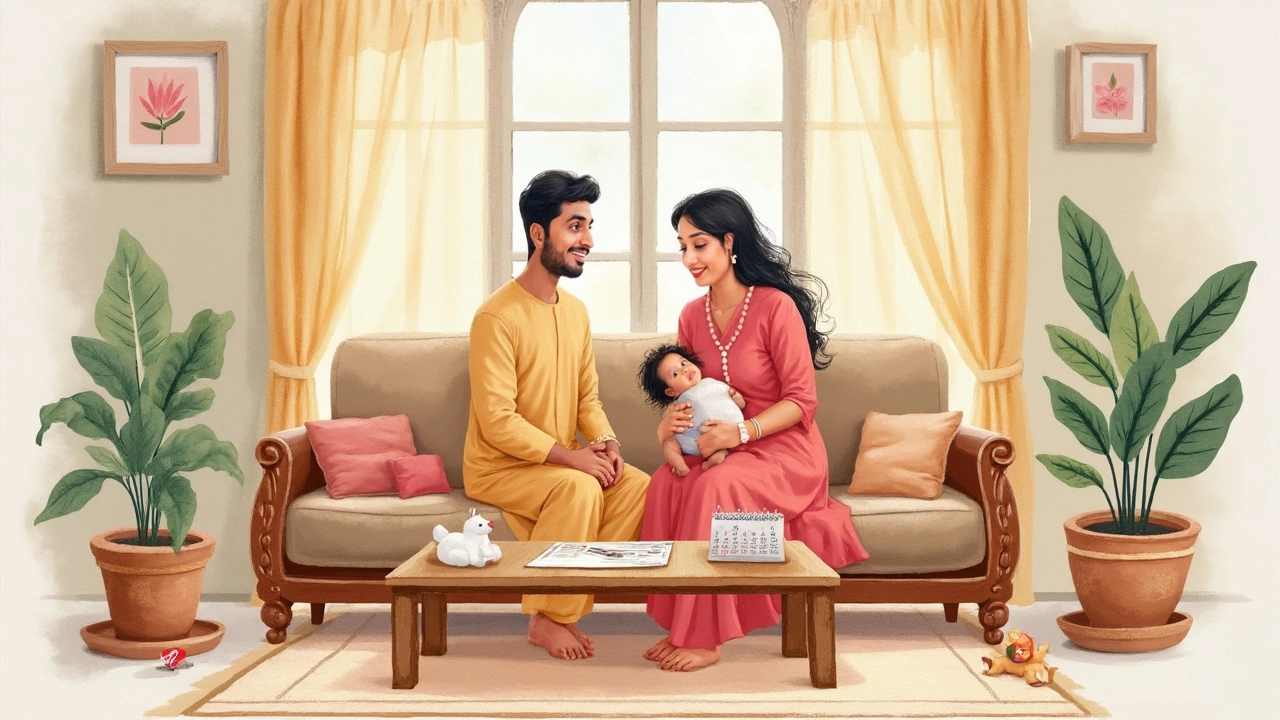IVF After Birth: How Soon Can You Start Fertility Treatment Postpartum?
 Jul, 2 2025
Jul, 2 2025
It’s wild how life can twist your plans. One moment you’re knee-deep in diapers, barely catching any sleep, and then bam—thoughts of growing your family pop up again. Maybe you always hoped for babies close in age, or maybe you’re racing against biological clocks. Either way, the big question hangs in the air: IVF after baby—how soon is too soon, and when is it safe to try again?
The Science of Postpartum Recovery & Fertility
No matter how fit you felt before pregnancy, giving birth is a huge physical event. Your body goes through a ton—your hormones dip, your uterus shrinks, your cycles stall. Most experts agree: your body’s first job after birth is to heal. The NHS usually recommends waiting at least 12 months before another pregnancy, whether naturally or with help from IVF. That’s because studies show the risk of things like miscarriage, preterm birth, and low birth weight shoots up if you get pregnant again less than a year after delivering.
Physically, your reproductive system needs a chance to reset. Your uterus, for instance, needs weeks to return to pre-pregnancy size—usually about six. Your hormone levels, especially if you’re breastfeeding, might not balance out for even longer. Prolactin (the breastfeeding hormone) suppresses ovulation, so it can take months for cycles to restart. Some mums see periods return within six weeks; others wait six months or longer, especially if their baby nurses regularly overnight.
During pregnancy, your body loses iron and important nutrients. Rushing into another conception or IVF could leave you and your next baby short on essentials like folate and vitamin D. If you’re already low on reserves, fertility treatment could take a bigger toll or cause complications. A good doctor will want to check your bloodwork carefully before considering IVF.
Here’s a quick look at postpartum milestone markers doctors watch for:
| Milestone | Average Time After Birth |
|---|---|
| Uterus returns to normal size | 6 weeks |
| Menstrual cycle may return | 6 weeks–6 months |
| Hormone levels balance | 6 weeks–6 months |
| Nutrient stores replenish | 6–12 months |
If you had a c-section or tough delivery, healing can take longer. Some women face complications like infections or postpartum hemorrhage, which can push out a safe IVF window even further. Bottom line: your body has just run a marathon. Time matters.
Medical Guidelines: What Do the Experts Say?
Doctors around the world echo the same basic advice: give your body a solid break before another pregnancy attempt, especially with IVF. The American Society for Reproductive Medicine suggests waiting at least 3–6 months after giving birth before starting fertility drugs or egg retrieval, and ideally a full 12 months before trying embryo transfer. The British Fertility Society also highlights increased risks with short gaps between pregnancies, especially for c-section births. If you had a caesarean, waiting 18 months is generally best to avoid uterine rupture or scarring problems.
Why does it matter more with IVF? For one thing, IVF usually means strong hormone injections—these push your body hard to grow extra eggs. If your body is still depleted or your uterus hasn’t healed, you’re at higher risk for serious complications. IVF pregnancies may also carry a slightly higher risk for things like preterm birth even in healthy women, so doctors double down on waiting for the best possible window.
No rule is one-size-fits-all. Women over 35, or anyone struggling with certain fertility diagnoses, sometimes face extra pressure to move quickly because egg quality drops with age. If that’s you, a fertility specialist might do checks like ultrasound scans, hormone panels, and even laparoscopy to see how well your body’s recovered. Even then, though, most won’t suggest IVF sooner than about 6 months after birth unless there’s a serious reason to rush.
If you’re not breastfeeding, your cycle likely returns sooner—and that sometimes pushes the starting line a little earlier. Still, most clinics in the UK and Europe will want to see three regular cycles in a row before scheduling IVF. If you’re breastfeeding, hormone suppression can make IVF less effective and riskier—many clinics won’t even try stimulation until nursing has stopped.
Here are some red flags that often mean waiting longer:
- Ongoing vaginal bleeding after birth
- Iron-deficiency anaemia or low energy
- Signs of infection or pain where your uterus is
- High blood pressure or other untreated postpartum health problems
Serious about IVF soon after birth? Schedule a deep checkup with your GP and get a referral to a dedicated fertility clinic. Push for honest, tailored advice. Your recovery isn’t the same as someone else’s.

What to Expect If You’re Considering IVF Quickly
Deciding to go ahead with IVF soon after giving birth? There’s extra ground to cover. First, your clinic will likely want to run a lot of tests: a pelvic scan to check your uterus lining, blood work to rule out infection or anaemia, and hormone levels. If anything’s even slightly off, they’ll push for a delay rather than risk further complications for you or a future baby.
Egg collections (where they stimulate your ovaries and grab several eggs at once) can be hard on the body. If you’re already low on energy, nutrients, or sleep, side effects like bloating, pain, or even ovarian hyperstimulation hit harder than average. If you’re nervous about this, ask if there’s the option to freeze embryos and transfer them later, after more recovery time. Fresh embryo transfers are rarely recommended less than 6 months postpartum, because your hormone levels can be unpredictable and your uterus may be less able to support implantation.
Might be wondering—what if your period still hasn’t returned? Oddly enough, IVF sometimes works even without a natural cycle, but many doctors want at least two or three cycles to confirm your system is running smoothly. Think of it as a stress test for your biology before adding more demands.
You should be prepared for some tough conversations. Pregnancy loss rates are higher after closely-spaced pregnancies. Babies born within a year of an older sibling are at greater risk for being premature or having a lower birthweight. This isn’t a scare tactic: the numbers are real. One published study in The Lancet reviewed 148,000 cases and found babies conceived within 6 months of a previous birth were 40% more likely to arrive early. These risks drop steeply if you wait a year, which is why clinics push for patience.
Many couples also forget the personal side—IVF is stressful. Add in a newborn’s needs, sleepless nights, and hormonal rollercoasters, and the mental strain can double. It’s not just about your body recovering, but your mind too. Counsellors or fertility therapists can be gold for balancing expectations and stress during this time.
Here’s a breakdown of what you’ll likely face:
| Step | What’s Involved |
|---|---|
| Initial checkup | Physical exam, bloodwork, ultrasound |
| Cycle monitoring | Tracking your periods and hormone levels |
| Ovarian stimulation | Hormone injections to grow eggs |
| Egg retrieval | Minor surgery to collect eggs |
| Embryo culture | Eggs fertilised and grown in lab |
| Transfer | Embryo placed in uterus |
Even though you might want to fast-track the process, each step adds stress for you and your infant at home. Having a plan for extra support—family, friends, partner—can take a mountain off your shoulders.
Practical Tips, Next Steps, and Real-Life Advice
If you don’t want to wait, the urge is real. Here’s what can actually smooth (or speed up) recovery and open the IVF window earlier—without gambling your health:
- Eat iron-rich, nourishing foods. Think lentil soup, leafy greens, eggs, salmon, whole grains. Top up with a good postnatal vitamin.
- Prioritise quality sleep—easier said than done, right? Even napping during the day aids recovery.
- Hydrate like mad. Your body needs extra fluids after birth and especially if you’re nursing.
- Don’t rush exercise, but gentle walking is great for circulation and mood. Ask your GP about postpartum-safe routines.
- Keep up with all postpartum checkups. If you notice anything unusual—pain, bleeding, fevers—get it checked fast.
- Talk through your plan with a fertility specialist, not just your GP.
- Be honest about your mental health. IVF can amplify postnatal depression or anxiety, and support really helps prevent burnout.
- If you faced infertility to start with, find out if your diagnosis (like PCOS or endometriosis) changes postpartum. Sometimes IVF is easier after one healthy birth; sometimes it needs more caution.
- If time is ticking due to age or medical reasons, talk to your doctor about embryo freezing and delayed transfers—it can give flexibility without pushing your body too hard, too soon.
Want some perspective? When I spoke to local mums in Birmingham support groups, the consensus was clear: those who waited at least 9 months to a year for IVF after birth felt more resilient and had smoother pregnancies. The science matches up, but real-life stories echo it too.
So how soon can you do IVF after having a baby? Let your own body, health, and energy—not just the calendar—call the shots. No newborn needs two exhausted parents at once, and your recovery sets up your next child’s best start too.